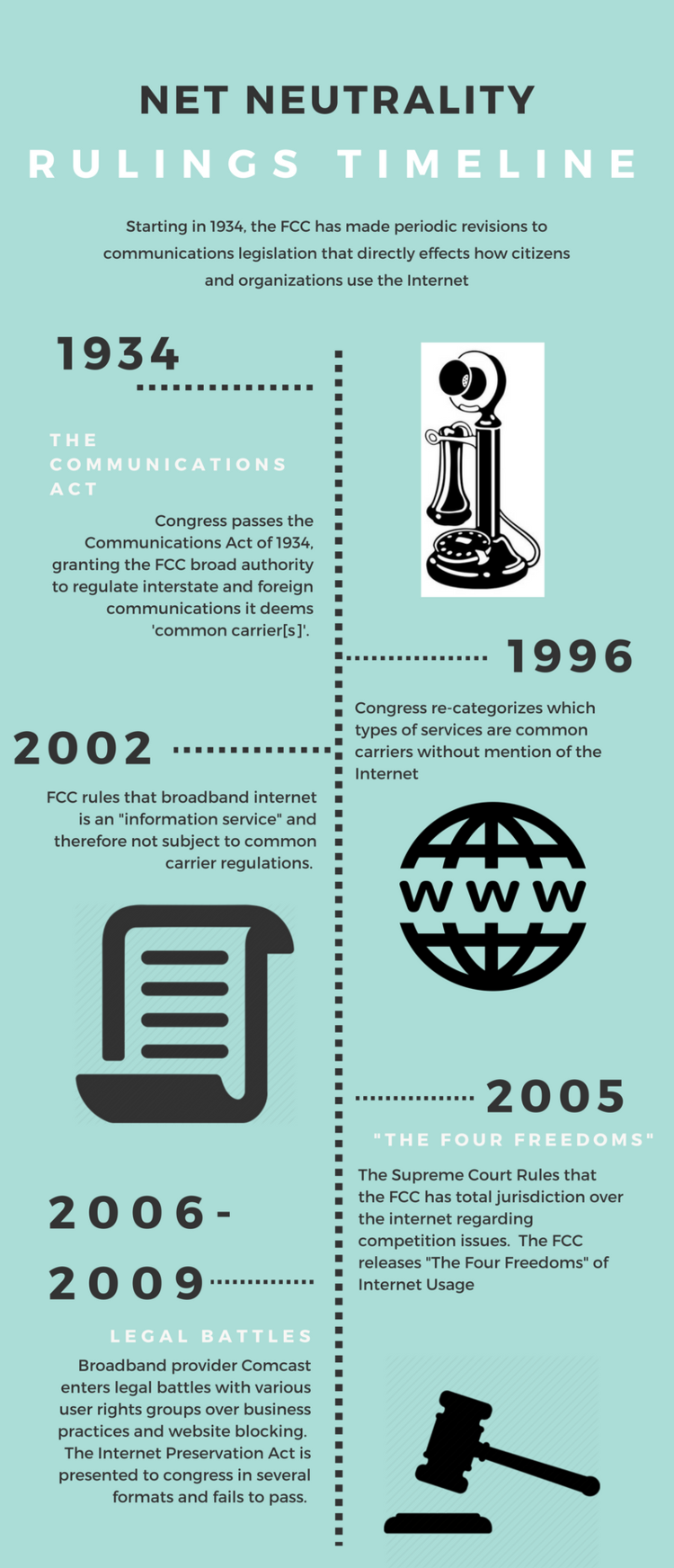In 2011 AMT Lab wrote a piece titled “The Fight Over Net Neutrality Is Far From Over.” Six years later this title still holds true. The open internet serves as a great benefit for artists and arts managers in all fields. Restrictions on access or paid premiums to bandwidth stand to impose both creative and financial burdens upon the arts community. The current administration has vocalized their opposition to the idea of an open internet and there are several bills currently in circulation that contain small clauses meant to circumvent the power of the Federal Communications Commission (FCC) or create opportunities for Internet Service Providers (ISP’s) to begin treating internet access as a paid commodity available to those who can pay the most. In order for you to get up to speed on net neutrality legislation changes, take a look at the infographic below. Then, we will dive into the current proposed changes and implications for the arts.
Current Legislation and Political Actions Effecting Net Neutrality
The current head of the FCC, Ajit Pai, has stated that the FCC will begin to reflect the ideologies of the current presidential administration and has stated publicly that open internet protections were “a mistake.” This is not an unusual stance. During the Obama administration the government and the FCC worked together in creating consumer protections, discounting high speed internet service, reducing the rates for using prison phones, and many others. Now that the two groups have had a change of guard we will begin to see a reversal on many of these legislative actions.
In 2015 the FCC ruled against the reclassifying of internet access as a telecommunications service. This effectively prevented broadband companies from prioritizing connectivity, throttling internet speeds, and blocking certain groups from access to broadband. Many groups anticipate a reversal of this stance in the coming months, as the current president has recently stated it to be a priority.
Currently there is a bi-partisan effort within the Senate to pass a bill that would codify the primary components of the 2015 legislation, the primary issue being to prohibit prioritization of broadband. Open internet advocates believe that these measures do not go far enough in ensuring current consumer protections. The primary focus of legislative efforts revolves around Title II, a sub-section of the Communications Act of 1934. Many open internet advocates believe that placing the Internet under Title II would allow the FCC to maintain current consumer protections by regulating against paid prioritization. More on the specifics of Title II can be found here. In short, Title II stands as the keystone of arguments both for and against net neutrality. A change to the 1934 legislation would have to occur in order for changes to net neutrality to take effect.
Implications for Arts Managers and Organizations
A reclassification of broadband internet would allow ISP’s to regulate internet speeds and access and offer priority-style access and speed to companies who paid a higher fee. Furthermore it would allow the FCC to block access to specific content as they see fit. Paid priority access would leave non profit organizations at a disadvantage, as larger for profit entities could essentially buy them out of a given digital realm by controlling a majority of bandwidth and access points. The problem is intensified for organizations who maintain large collections of digital media, as accessing and updating these files could become cumbersome on both the business and consumer sides, effectively removing individual access. For example, many libraries maintain digital recordings of educational material. Unless this library could afford a priority access to internet bandwidth and speed allocation, users would struggle to access larger volumes of information due to slow access speeds. Prioritized access to broadband creates a myriad of problems for digital content creators as well, such as artists who earn a living streaming their works online. Performance arts venues would also suffer due to restricted or limited access to broadband. Activities such as accessing offsite patron databases or operating online ticket purchasing systems require ample connection speeds in order to ensure efficient service.
The concept of net neutrality and controlled access to broadband holds negative implications for all but the wealthiest of individuals and organizations who can afford priority access. A deeper look into the issue reveals that low income individuals and racial minority groups stand to lose the most, as many consumer protections have benefitted these individuals over the past decade. As arts managers, we work daily to create art experiences that are accessible to all. We also realize the importance of art in areas of the country with greater concentrations of low income individuals or high crime rates. The idea that broadband access can be treated as a commodity and placed behind a paywall stands in opposition to the values that many artists hold in regards to access and equality. Think about your daily workflow as an artist or arts manager; how would limited or restricted access to broadband hamper your workflow and ultimately your bottom line? Let us (and more importantly, your congressperson) know.



